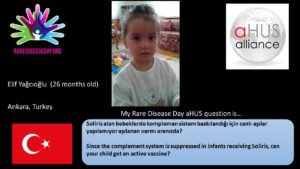The body’s immune system is made up of many parts. aHUS patients know only too well about one part of the innate ( inherited and born with it) immune system – the alternative pathway of Complement.
Human beings acquire additional immunity, firstly from their mother, and then by the natural process of producing antibodies to bacteria and viruses ( through another part of the innate immune system called lymphocytes, specifically B cells ) as they experience the diseases of childhood; and then on through life .
Additional immunity can also be acquired in a similar way through vaccinations. Vaccinations introduce disease causing viruses and bacteria which do not trigger an infection; but do stimulate antibody production to protect against potential infections in the future.
Eculizumab is an antibody which attaches to a part of the Complement System, C5, and, when it does so, it not only stops the uncontrolled process ,which is so damaging to aHUS patients, but it also stops that part of the immune system from working and the patient becomes immune suppressed , doubly so if the aHUS patient has had a transplant too.
One of the early observations, in the trials of eculizumab for PNH, was that patients were exposed to the risk of meningococcal infections. This led to the protocol of vaccination for meningitis before use of eculizumab. Patients are advised to be vaccinated for the ACWY and B strains of the disease to acquire immunity . In some countries use of prophylactic antibiotics is prescribed to further boost the immunity.
In the Rare Disease Day video ( now approaching 800 views click here to see) there was a question about the safety of vaccinations whilst receiving eculizumab, Elif of Ankara Turkey asks ” Since the complement system is suppressed in infants receiving eculizumab , can your child get an active vaccine? “

In most countries there are health protection programmes for children that provide vaccinations to protect against common and serious life threatening illness such as measles , polio and TB. Adults who travel may seek additional protection from diseases more common in other countries e.g. hepatitis .
It is a matter of choice, however, whether to risk being vaccinated or face the risks of having the infectious diseases. Clinical advice is needed based on existing data.
aHUS patients must experience the risk from a meningitis vaccination to have eculizumab treatment in the first place , and then need boosters from time to time depending on duration of treatment . There have been a few cases of meningitis reported ,and usually patient non compliance is the cause when it has happened.
So Elif, aHUS patients experience of vaccinations with eculizumab treatment is a valid research topic, and one which the aHUS Registry for one should consider for its research programme.

